The vessel, known as the Bronze Tiger Ying, was auctioned in April by Britain's Canterbury Auction Galleries.
The buyer, through the auction house, contacted China's State Administration of Cultural Heritage (SACH) in late April and expressed hope for an unconditional donation.
Resources show the vessel, once belonging to the royal family of the Qing Dynasty (1644-1911), was taken away by British military officer Harry Evans from the Old Summer Palace, which was sacked and destroyed in 1860 during the invasion of Anglo-French allied forces.
Representatives from SACH and experts with the National Museum of China visited Britain in September to authenticate the bronze vessel, which dates back to the Western Zhou period (1046 BC-771 BC).
"Chinese cultural relics lost overseas are an important component of the cultural heritage of our country," said Liu Yuzhu, head of SACH, adding they bear the profound history and cultural emotions of the Chinese people.
Liu said SACH has in recent years successfully facilitated the return of many lost cultural relics to China, and the return of the Bronze Tiger Ying is a representative model.
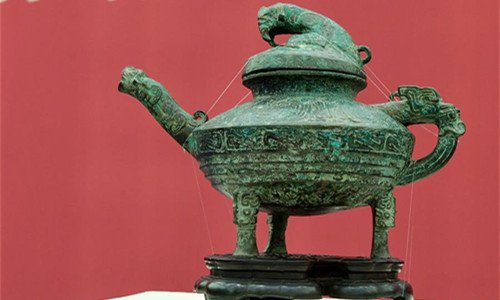
The Bronze Tiger Ying looted from Yuanmingyuan, or the Old Summer Palace, returns to China and is displayed at a ceremony to mark its entering the collections at the National Museum of China in Beijing, capital of China, Dec. 11, 2018. The vessel was auctioned in April by Britain's Canterbury Auction Galleries. The buyer, through the auction house, contacted China's State Administration of Cultural Heritage (SACH) in late April and expressed hope for an unconditional donation. Resources show the vessel, once belonging to the royal family of the Qing Dynasty (1644-1911), was taken away by British military officer Harry Evans from the Old Summer Palace, which was sacked and destroyed in 1860 during the invasion of Anglo-French allied forces. Representatives from SACH and experts with the National Museum of China visited Britain in September to authenticate the bronze vessel, which dates back to the Western Zhou period (1046 BC-771 BC). "Chinese cultural relics lost overseas are an important component of the cultural heritage of our country," said Liu Yuzhu, head of SACH, adding they bear the profound history and cultural emotions of the Chinese people. Liu said SACH has in recent years successfully facilitated the return of many lost cultural relics to China. (Xinhua/Li He)
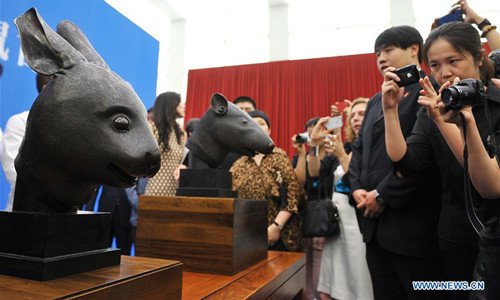
File photo taken on June 28, 2013 shows people taking pictures of two bronze animal head sculptures plundered by western invaders one-and-a-half centuries ago during a handover ceremony of the heads in Beijing, capital of China. The heads of a rat and a rabbit, parts of a fountain clock that previously stood at the Old Summer Palace, or "Yuanmingyuan" in Chinese, were donated on April 26, 2013 by the Pinault family. A Chinese bronze vessel looted from Yuanmingyuan, or the Old Summer Palace, has recently returned to China and entered the collections at the National Museum of China on Dec. 11, 2018. "Chinese cultural relics lost overseas are an important component of the cultural heritage of our country," said Liu Yuzhu, head of China's State Administration of Cultural Heritage (SACH), adding they bear the profound history and cultural emotions of the Chinese people. Liu said SACH has in recent years successfully facilitated the return of many lost cultural relics to China. (Xinhua/Li Xin)
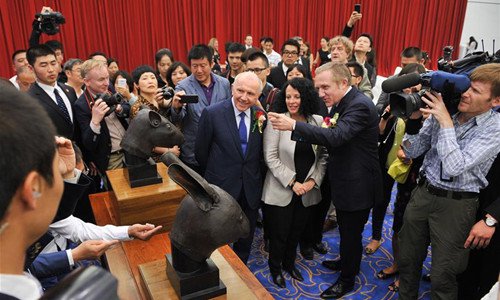
File photo taken on June 28, 2013 shows people looking at two bronze animal head sculptures plundered by western invaders one-and-a-half centuries ago at a handover ceremony of the heads in Beijing, capital of China. The heads of a rat and a rabbit, parts of a fountain clock that previously stood at the Old Summer Palace, or "Yuanmingyuan" in Chinese, were donated on April 26, 2013 by the Pinault family. A Chinese bronze vessel looted from Yuanmingyuan, or the Old Summer Palace, has recently returned to China and entered the collections at the National Museum of China on Dec. 11, 2018. "Chinese cultural relics lost overseas are an important component of the cultural heritage of our country," said Liu Yuzhu, head of China's State Administration of Cultural Heritage (SACH), adding they bear the profound history and cultural emotions of the Chinese people. Liu said SACH has in recent years successfully facilitated the return of many lost cultural relics to China. (Xinhua/Li Xin)
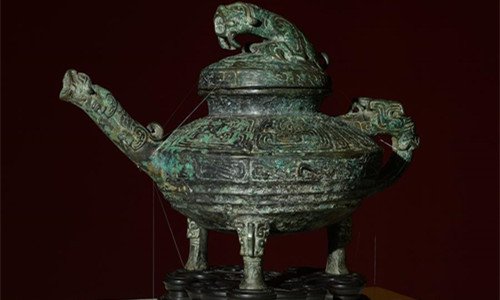
The Bronze Tiger Ying looted from Yuanmingyuan, or the Old Summer Palace, returns to China and is displayed at a ceremony to mark its entering the collections at the National Museum of China in Beijing, capital of China, Dec. 11, 2018. The vessel was auctioned in April by Britain's Canterbury Auction Galleries. The buyer, through the auction house, contacted China's State Administration of Cultural Heritage (SACH) in late April and expressed hope for an unconditional donation. Resources show the vessel, once belonging to the royal family of the Qing Dynasty (1644-1911), was taken away by British military officer Harry Evans from the Old Summer Palace, which was sacked and destroyed in 1860 during the invasion of Anglo-French allied forces. Representatives from SACH and experts with the National Museum of China visited Britain in September to authenticate the bronze vessel, which dates back to the Western Zhou period (1046 BC-771 BC). "Chinese cultural relics lost overseas are an important component of the cultural heritage of our country," said Liu Yuzhu, head of SACH, adding they bear the profound history and cultural emotions of the Chinese people. Liu said SACH has in recent years successfully facilitated the return of many lost cultural relics to China. (Xinhua/Li He)
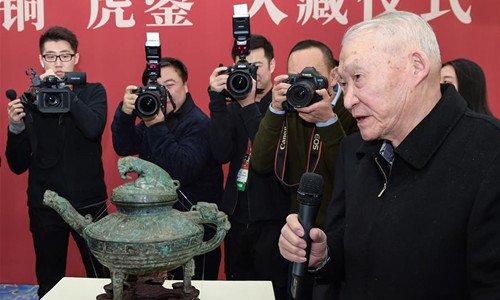
Cultural relic expert Sun Ji introduces the Bronze Tiger Ying looted from Yuanmingyuan, or the Old Summer Palace, during a ceremony to mark its entering the collections at the National Museum of China in Beijing, capital of China, Dec. 11, 2018. The vessel was auctioned in April by Britain's Canterbury Auction Galleries. The buyer, through the auction house, contacted China's State Administration of Cultural Heritage (SACH) in late April and expressed hope for an unconditional donation. Resources show the vessel, once belonging to the royal family of the Qing Dynasty (1644-1911), was taken away by British military officer Harry Evans from the Old Summer Palace, which was sacked and destroyed in 1860 during the invasion of Anglo-French allied forces. Representatives from SACH and experts with the National Museum of China visited Britain in September to authenticate the bronze vessel, which dates back to the Western Zhou period (1046 BC-771 BC). "Chinese cultural relics lost overseas are an important component of the cultural heritage of our country," said Liu Yuzhu, head of SACH, adding they bear the profound history and cultural emotions of the Chinese people. Liu said SACH has in recent years successfully facilitated the return of many lost cultural relics to China. (Xinhua/Li He)
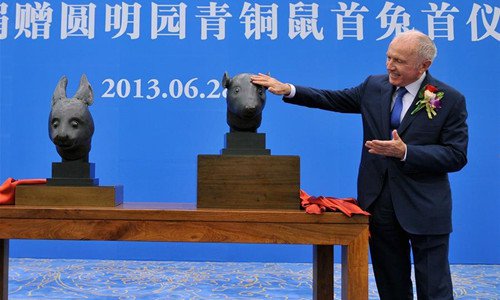
File photo taken on June 28, 2013 shows Francois-Henri Pinault, CEO of PPR Foundation and the "owner" of two bronze animal head sculptures, unveiling a handover ceremony of the heads plundered by western invaders one-and-a-half centuries ago in Beijing, capital of China. The heads of a rat and a rabbit, parts of a fountain clock that previously stood at the Old Summer Palace, or "Yuanmingyuan" in Chinese, were donated on April 26, 2013 by the Pinault family. A Chinese bronze vessel looted from Yuanmingyuan, or the Old Summer Palace, has recently returned to China and entered the collections at the National Museum of China on Dec. 11, 2018. "Chinese cultural relics lost overseas are an important component of the cultural heritage of our country," said Liu Yuzhu, head of China's State Administration of Cultural Heritage (SACH), adding they bear the profound history and cultural emotions of the Chinese people. Liu said SACH has in recent years successfully facilitated the return of many lost cultural relics to China. (Xinhua/Li Xin)
